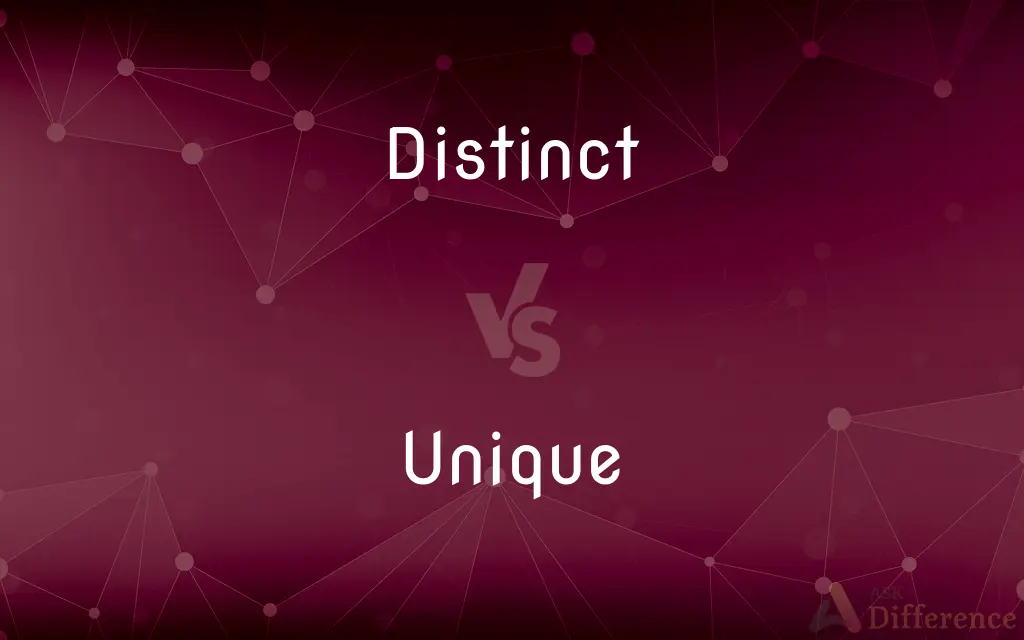Distinct vs. Unique — What's the Difference?
By Tayyaba Rehman — Updated on September 26, 2023
Distinct refers to being noticeably different from others, whereas unique means being the only one of its kind.

Difference Between Distinct and Unique
Table of Contents
ADVERTISEMENT
Key Differences
Distinct and unique, two adjectives often used interchangeably, connote different aspects of singularity and difference. Distinct is used to describe things that are clearly distinguishable or different from each other in specific ways, often referring to characteristics that separate an entity from others in a group. It doesn’t necessarily imply being the only one of its kind but stresses on the clear differentiation, which might be through characteristics, features, or appearance.
Unique, on the other hand, conveys the essence of being singular and unparalleled, being the only one of its kind. It is used to describe something that is unparalleled, unmatched, and exists as the only example. This term often implies a certain value and rarity, highlighting the exclusivity and non-replicability of the subject.
In usage, distinct places emphasis on clear, definable differences and separations between items or concepts, often used to delineate varieties within a group or category. It doesn’t accentuate exclusivity but rather the recognizable differences that exist, making it appropriate for distinguishing similar items with clear demarcations.
Conversely, unique accentuates the singular existence and the inimitable nature of the subject. When something is labeled as unique, it is understood as being incomparable and without an equivalent, embodying a sense of rarity and exceptional value. It is a term that elevates the subject by emphasizing its unparalleled nature and exclusivity.
In summation, distinct emphasizes clear, recognizable differences within a group or category without implying singularity, while unique underscores the unparalleled, singular nature and existence of the subject, often attributing a sense of rarity and value.
ADVERTISEMENT
Comparison Chart
Implication
Clearly different or distinguishable
Being the only one of its kind
Exclusivity
Doesn’t imply exclusivity
Implies exclusivity and rarity
Comparisons
Used to show differences within a group
Denotes no comparable equivalent exists
Value Attribution
Does not attribute value
Often attributes higher value due to singularity
Replicability
Doesn’t imply non-replicability
Implies non-replicability
Compare with Definitions
Distinct
Separate and different in comparison to others.
Each member of the committee had a distinct opinion on the matter.
Unique
Possessing a character that is solely its own.
The building had a unique architectural design.
Distinct
Not having similarities; having unique characteristics.
The artifact had a distinct design not found in any other.
Unique
Not able to be replicated or duplicated.
The artist’s technique was so unique it couldn’t be replicated.
Distinct
Clearly distinguishable in nature.
The distinct features of the species helped in identifying it accurately.
Unique
Being the only one of its kind; unparalleled.
The painting had a unique style, attracting many enthusiasts.
Distinct
Recognizably different in scope or nature.
The two theories have distinct approaches to the problem.
Unique
Exhibiting rare and exceptional traits.
Her voice had a unique tone, captivating everyone who heard it.
Distinct
Clearly perceptible or marked out.
The path had distinct markers for guidance.
Unique
Being the only one of its kind; unlike anything else
The situation was unique in British politics
Original and unique designs
Distinct
Recognizably different in nature from something else of a similar type
There are two distinct types of sickle cell disease
The patterns of spoken language are distinct from those of writing
Unique
A unique person or thing
Some of Lamb's writings were so memorably beautiful as to be uniques in their class
Distinct
Readily distinguishable by the senses
A distinct smell of nicotine
Unique
Being the only one of its kind
The unique existing example of Donne's handwriting.
Distinct
Readily distinguishable from all others; discrete
On two distinct occasions.
Unique
Characteristic only of a particular category or entity
A weather pattern that is unique to coastal areas.
Distinct
Easily perceived by the senses
A distinct flavor.
Unique
Remarkable; extraordinary
A unique opportunity to buy a house.
Distinct
Clearly defined; unquestionable
At a distinct disadvantage.
Unique
(uncomparable) Being the only one of its kind; unequaled, unparalleled or unmatched.
Every person has a unique life, therefore every person has a unique journey.
Distinct
Capable of being perceived very clearly.
Her voice was distinct despite the heavy traffic.
Unique
Of a feature, such that only one holder has it.
Distinct
Different from one another (with the preferable adposition being "from").
Horses are distinct from zebras.
Unique
Particular, characteristic.
Distinct
Noticeably different from others; distinctive.
Olga's voice is quite distinct because of her accent.
Unique
(proscribed) Of a rare quality, unusual.
Distinct
Separate in place; not conjunct or united; with from.
Unique
A thing without a like; something unequalled or unparallelled; one of a kind.
Distinct
(obsolete) Distinguished; having the difference marked; separated by a visible sign; marked out; specified.
Unique
Being without a like or equal; unmatched; unequaled; unparalleled; single in kind or excellence; sole.
Distinct
(obsolete) Marked; variegated.
Unique
A thing without a like; something unequaled or unparalleled.
The phenix, the unique pf birds.
Distinct
To distinguish; to make a distinction.
Unique
Radically distinctive and without equal;
He is alone in the field of microbiology
This theory is altogether alone in its penetration of the problem
Bach was unique in his handling of counterpoint
Craftsmen whose skill is unequaled
Unparalleled athletic ability
A breakdown of law unparalleled in our history
Distinct
Distinguished; having the difference marked; separated by a visible sign; marked out; specified.
Wherever thus created - for no placeIs yet distinct by name.
Unique
(followed by `to') applying exclusively to a given category or condition or locality;
A species unique to Australia
Distinct
Marked; variegated.
The which [place] was dightWith divers flowers distinct with rare delight.
Unique
The single one of its kind;
A singular example
The unique existing example of Donne's handwriting
A unique copy of an ancient manuscript
Certain types of problems have unique solutions
Distinct
Separate in place; not conjunct; not united by growth or otherwise; - with from.
The intention was that the two armies which marched out together should afterward be distinct.
Unique
Highly unusual or rare but not the single instance;
Spoke with a unique accent
Had unique ability in raising funds
A frankness unique in literature
A unique dining experience
Distinct
Not identical; different; individual.
To offend, and judge, are distinct offices.
Unique
Singular in nature, without any equivalent.
His approach to solving problems was unique and effective.
Distinct
So separated as not to be confounded with any other thing; not liable to be misunderstood; not confused; well-defined; clear; as, we have a distinct or indistinct view of a prospect.
Relation more particular and distinct.
Distinct
To distinguish.
Distinct
Easy to perceive; especially clearly outlined;
A distinct flavor
A distinct odor of turpentine
A distinct outline
The ship appeared as a distinct silhouette
Distinct fingerprints
Distinct
(often followed by `from') not alike; different in nature or quality;
Plants of several distinct types
The word `nationalism' is used in at least two distinct senses
Gold is distinct from iron
A tree related to but quite distinct from the European beech
Management had interests quite distinct from those of their employees
Distinct
Constituting a separate entity or part;
A government with three discrete divisions
On two distinct occasions
Distinct
Recognizable; marked;
Noticed a distinct improvement
At a distinct (or decided) disadvantage
Distinct
Clearly or sharply defined to the mind;
Clear-cut evidence of tampering
Claudius was the first to invade Britain with distinct...intentions of conquest
Trenchant distinctions between right and wrong
Common Curiosities
Is something unique considered rare and valuable?
Often, unique items are considered rare and valuable due to their singular nature.
Is distinct suitable for distinguishing similar items with clear demarcations?
Yes, distinct is suitable for distinguishing similar items with clear, definable differences.
Can distinct refer to separate entities within a group?
Yes, distinct often refers to separate, different entities within a group or category.
Does unique refer to being the only one of its kind?
Absolutely, unique refers to something that is the only one of its kind.
Is uniqueness related to non-replicability?
Yes, something unique is generally considered non-replicable and inimitable.
Can distinct items have similarities?
Yes, distinct items can have similarities but have clear, recognizable differences.
Does distinct imply clear and noticeable differences?
Yes, distinct implies clear and noticeable differences between things.
Does distinct emphasize clear demarcation without implying singularity?
Exactly, distinct emphasizes clear demarcation and differences without implying singularity.
Can something be unique without any comparable equivalent?
Indeed, something unique exists without any comparable equivalent, being singular and unparalleled.
Does the term unique elevate the subject by emphasizing its unparalleled nature?
Yes, labeling something as unique often elevates its perceived value by emphasizing its unparalleled and singular nature.
Does unique imply exclusivity?
Yes, unique strongly implies exclusivity, indicating that something is the only one of its kind.
Can distinct items exist within the same category or group?
Absolutely, distinct items can and often do exist within the same category or group but are clearly distinguishable from each other.
Share Your Discovery

Previous Comparison
Locale vs. Local
Next Comparison
Acrylate vs. AcrylicAuthor Spotlight
Written by
Tayyaba RehmanTayyaba Rehman is a distinguished writer, currently serving as a primary contributor to askdifference.com. As a researcher in semantics and etymology, Tayyaba's passion for the complexity of languages and their distinctions has found a perfect home on the platform. Tayyaba delves into the intricacies of language, distinguishing between commonly confused words and phrases, thereby providing clarity for readers worldwide.














































